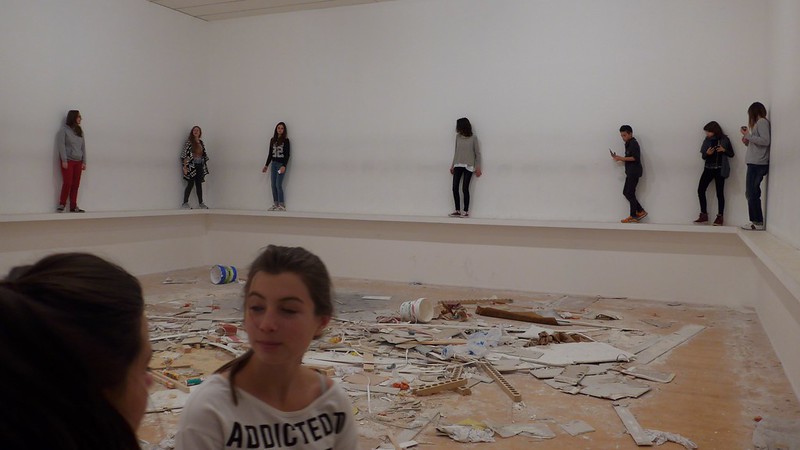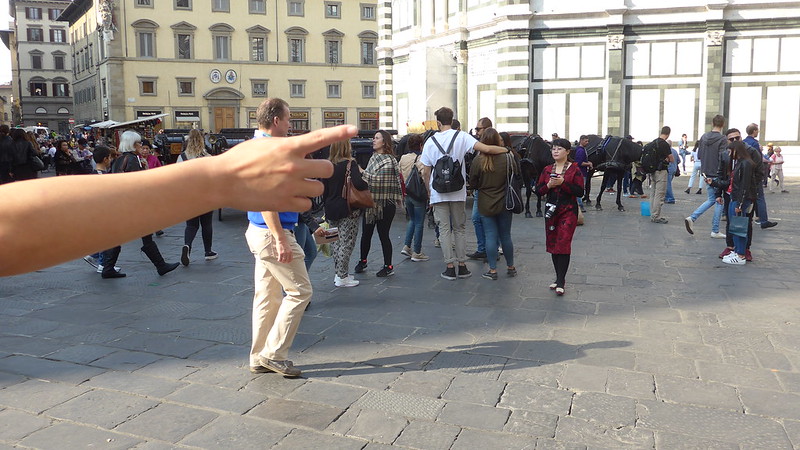Therapy-resistant unless i see eye to eye – Anti-authoritarian therapy could be the way forward – Don’t make me beg
A few weeks ago Peter Gelderloos published an excellent essay about his experiences with therapy. I enjoyed reading most of it, but responded with a few objections (see bellow). Since then i wanted to expand on these thoughts, hoping to write my own take on therapy. So here i go:
I am an asshole.
A thoroughly fucked up person.
There.
I said it.
And so are you.
Presumably.
Sorry.
This is an educated guess.
I do not mean to overstep.
But let’s face it.
Most of us are fucked up.
And how could we not be?!
To arrive where we are at today most of us were forced to wade through the toxic soup of patriarchal, racist, sexist, white supremacists, homophobic etc. bullshit, that undergirds our entire culture. Only a miraculous few of us, if any at all, managed to come out on the other side unscathed.

tl;dr: My grand theory is this. Most human beings are assholes. But most of us have learned to put on a mask in order to hide our inner asshole from others. We are sent to therapy to fix ourselves. But while classic therapy can, in the best case scenario, and in rare instances, teach people how to be less of an asshole, most often it only teaches people how to communicate their flaws in more acceptable ways. In the worst case scenario it teaches people how to deflect or twist or disguise their flaws. In most cases therapy teaches people how to mask their flaws even better. That’s pretty much it, really. At the same time therapy equips people with therapy speak, a deflection technique that coats them in teflon and thereby makes everything worse. Alternatives to classic therapy do exist, though. Who wants to explore MAST (Mutual Aid/Self Therapy) with me? I really sold that well, didn’t i? By telling you how difficult, how much of an asshole i am. But hey. I am ready. If you’ll have me. Don’t make me beg. Because i can always climb on top of a mountain or find some dark cave to go meditate.
But allow me to elaborate.
One of the main skills that we learn during our adolescence is how to hide the difficult parts of our personalities. Culture at large teaches us how to put a mask on, to help us hide how fucked up we know that we are underneath it all. Where i grew up, in central Europe, that’s pretty much all what we are taught. How to put on a brave face, to pretend that we are okay, easy going, a good sport. How to never show our complicated sides. Not to anyone. Ever. How to never be real. But also, this tells us that only we are to blame, if no one likes us.
In certain other cultures this might be a bit less pronounced. Seen from the outside they seem less conflict averse. But i wouldn’t know. Most of my time i lived in this culture, the capital of passive-aggression called Switzerland, or in a very similar culture in Northern California. Maybe in certain southern European cultures people are less addicted to harmony. They seem to enjoy an argument. Which to me sounds much more healthy in so many ways.
I often think that i was born into the wrong culture. Because living here, one of my great handicaps, or rather, what sets me apart from others, is that i have trouble keeping my mask up. To me masking my difficult parts always feels fake. Unreal. My mask does not represent me. It does not show who i am, or at least not the full picture.
Whenever i meet new people, and these days this happens never, at a certain point in the process of getting familiar with them, the wish overwhelms me to show them my full self, including my fucked up parts. It feels like i have this urge to be seen, and accepted, in my entirety, including the asshole bits that i (sometimes) have in me (and don’t we all?). When the first conflict with a new person occurs, and the same counts for new groups, it feels like a relief to me. Finally, we get to be real with each other. This is where it’s at for me. This is the test. Is this connection really worth pursuing, or is it not? Otherwise i lose interest.

As anarchists we try to question all the ways in which we have been programmed by the capitalist, sexist, racist, white supremacist etc. culture surrounding–but also shaping us. We try to examine how this culture has messed us up, and often it cuts quite deep. We try to change the ways we have been programmed. Anarchists tend to believe that any meaningful change has to start from within themselves, and that our emotional and psychological hang ups can’t be exempted. At least that’s what we should believe.
Sometimes the task feels overwhelming. Sometimes it feels too heavy to deal with all of this baggage within our circles. That’s when some of us turn to therapy for help. But therapy presents us with several fundamental dilemmas.
The capitalist system has outsourced the task of emotional or psychological healing to therapists, who in turn make a living from this activity. This is the first fundamental dilemma. It’s an imposition that runs counter to our models of communal care.
“Hey. Do you feel fucked up or broken?
Go seek help from that professional therapist.
Over there.
And pay for the service.”
The second dilemma anarchists face has to do with the inherent power imbalance that classic therapy always represents. Anarchists fight to create a society without authority nor hierarchy and that’s why all therapeutic settings clash with one of our core principles. Therapy always establishes a hierarchy, where the therapist is in charge, in the position of authority and expertise, while the person who receives the therapy finds themselves on the receiving end, in the subordinated position. The fact that therapy is a paid service only complicates the arrangement.
Even if therapists pretend otherwise, they are always in a position of power over us. If we are too honest about certain of our self-destructive urges, or maybe our suicidal ideation, they could get us sectioned, medicated or incarcerated. Too many therapists gladly, or sometimes without questioning it, contribute to the carceral logic of the system.
So what are we to do with all this? As anarchists we could, or maybe should, try to incorporate therapeutic elements into our communal and group processes. I am aware that this has been tried in the past, in the consciousness raising groups of the 70s etc., and not shown the greatest of results. But maybe we can take these past failures as inspiration and try again. Maybe the last word has not been spoken.
The question of mental health and the responsibility to find solutions has been individualized in our societies. Even personal relationships now undergo a cost/benefit analysis. Show me your difficult sides and You are fired. Swipe left. Next. Huge potentials for growth are lost in this way.
We are back to square one. We give up and we start to shop around for a therapist, it is our job and our responsibility, like an obedient citizen. The neoliberal order has turned it into our responsibility to search for a suitable therapist, to find a way to pay them and to learn how to hide most of our crap within ourselves. Don’t rock the boat. Brave it. Keep your mask on.
But fuck that.
A communal approach to therapy challenges a society where in increasing measure everything has turned interactional. That could be another reason why anarchists should pursue it. But we don’t. Too many of us prefer to outsource this task, even if it means that we behave in the exact same way as the rest of society.

In my life i never found a suitable professional therapist. Yet. And it might never happen, because i have stopped looking for one.
In the times when i did see therapists, several of them, i never trusted or even liked them. I filtered what i told them and as a result the therapy never went anywhere. I compartmentalized certain parts of myself, hid my suicidal ideation, my self-destructive urges, my political views from therapists. I guessed what they wanted to hear from me and delivered it to them. I went into harm-reduction mode. I was scared, because to get committed to a psychiatric institution, or to be prescribed addictive medication, would have been my death.
I blamed myself for this i started to suspect that i might be therapy-resistant.
Or should i maybe re-frame this as a skill, a resource. Maybe it’s a good ability to have, to intuit what therapist want to hear. No, that’s bollocks. Why should i pay someone with my hard-earned cash to act as my therapist to then not even show them who i really am? This feels all wrong.
A few years later i understood that the underlying problem for me was my mistrust, either towards the therapist or towards the therapy setting in general. The problem was the unacknowledged power imbalance, all those unspoken codes and taboos. Under different circumstances, and we’ll get into that in a minute, when there was no power imbalance, when i trusted the person in front of me, when we were seeing eye to eye, i did not resort to my usual tactics of masking, evading and deflecting. I was more than willing to learn about myself in the world and in relationship with myself and others.
The issue that held me back, when seeking out professional therapists, had been its fundamental premise. That’s what felt wrong to me, the absurdity of this setup. To pay someone to fix me up, so i could finally become a functional member of a society that i hated so much. Like a mechanic, but for my emotional wreckage.
It is our job to shop around for suitable therapists. Financial problems may well limit our choices even further. Once we do find a therapist, who feels like a match, which is total random, then that therapist will want to treat us forever. No therapist has any interest to “graduate” or “heal” their clients. Under the capitalist system therapists need the steady income. Bills need to be paid. How could they ever tell anyone that their therapy is now done? Some therapists make sure that it never happens.
Case in point, my sister. She has been in therapy for over 30 years and if anything it has only made her even more fucked up, even more evil, even more devious. To begin with my sister never struck me as someone who was interested in examining herself and being honest about it. Yet she keeps going to therapy. She is living proof that therapy does not work.
In therapy my sister has perfected therapy speech, a lingo that turns any discussion with her into torture.
Therapy speech, the teflon among languages. A language skill that makes any honest relationship impossible.
Classic therapy is the ultimate perpetuum mobile. A snake biting its own tail. Therapy is never done, and it also costs money. Money, that we need to acquire through working. In a workplace, that fucks us up further. Which then requires more therapy. And on and on.
What a brilliant idea, Mr. Freud.
[Look, i am not saying that there aren’t any good, well-intentioned therapists out there. I am sure that there are. Kudos to anyone who manages to find one of those. It’s so fucking random, though, a fucking lottery, and many of us never get so lucky. Because most therapists suck. But does it really need to be this way?! Maybe its premise really is all wrong!? [1]

One of the main reasons why i was attracted to anarchy [2], was because it seemed to accept any person exactly as they were. Not without challenging them on specific issues, of course, but with an underlying acceptance nevertheless. As a political philosophy anarchy seemed to invite friction, process, and even conflict, towards that end. One of its core principles, the veto right, trusts every single person to such a degree that they are even allowed to overrule a group decision. Everyone agrees that the right to veto should be used sparingly. But it is such a powerful principle, exactly because it acts as proof that each individual is trusted and respected, capable of understanding a given issue better than the group.
If you look at it through a conflict averse lens, a person who vetoes the group decision behaves like an asshole. What audacity, to oppose the group (hive) mind!? Upholding such a level of trust and respect for each individual demands lots of strength. The trick however is that it functions as a sort of paradox intervention.
When we feel that it is okay to be an asshole, it is much easier not to behave like one.
So that’s what attracted me, an asshole, to anarchy.
However, in recent years large parts of the anarchist scene have taken a turn towards conflict aversion, and i do not understand how this might have happened. The trend is reflected in some recent anarchist books. I’ll mention only one example here. While i really enjoyed Mutual Aid, the small book by Dean Spade that contains many helpful tools, charts and check lists, in the chapter on conflict the author proposes a hyper-individualistic approach. Instead of engaging in disputes, Spade suggest that people self-examine and find fault within themselves. The book does not outright recommend to avoid conflicts, but that’s what things boil down to.
But conflicts are an important part in community building processes. Quite often conflicts act cathartic. True, conflicts feel unpleasant, raw, sometimes even brutal. Yet we can’t skip a step to dive straight into our self-critique. The messy part needs to happen first. The conflict needs to be lived through, laid out, examined and understood. And only then can we attempt to fix it by asking ourselves “what else is true?”, in order to learn from it. Yet that’s where Spade asks us to start.
We can’t sanitize all our interactions. It is understandable that we strive for harmony and deeper understanding of our patterns. But sometimes it can only be achieved through a messy process like a conflict.
The reason why i single out Spade’s book here, is because the ‘what else is true’ method, has been weaponized against me in a group conflict a while ago. When it happened it felt awful, manipulative and, frankly, dishonest. Please do not wait until it happens to you to think this through.
The question reaches even deeper, though. Are we only talking about conflict aversion here, or isn’t this also a sign for a dose of neoliberal thinking that has infiltrated our community? The neoliberal political model famously tries to shift all the blame to personal responsibility. Anarchy does value personal responsibility, but only if it is based in solidarity and inclusion. But lately i suspect that the two philosophies have started to blur somewhat. And this is plausible, considering that for all these years we have been bombarded by a medial onslaught filled with neoliberal bullshit.
In short, conflicts are messy. They hurt. They suck. They drain our energy. Everyone hates them. But why? Let’s love them instead.
They are a crucial part in our process of building trust in groups, which is why conflicts should be invited. In recent times i sometimes mentioned Starhawk, the old school San Francisco wiccan anarchist, as an example for a better, meaning more inviting approach towards conflict. Her approach, in her older books, seemed much more inclusive. Imagine my surprise, when i read the title of a recent podcast by Starhawk: Stop Being an Asshole.
Hmm.
To contrast all this allow me to quote Piepzna-Samarasinha in an essay featured in their book Care Work:
“The community is not a magic utopia, just like our families weren’t, and we don’t all just magically love each other, or even like each other, let alone agree on every political issue. I think about people I know who are mean or angry or bitter or “hard to like”—and disabled—and how that confluence is not a surprise or an accident, because many of us are indeed in a shitty mood, mean, or bitter from withstanding decades of ableism and the isolation that it brings.”
That’s much more down my alley. Neurodivergent and disabled people, like myself, have valid reasons to sometimes feel angry and bitter. And why should we have to hide all that? Why shouldn’t that be a part of our communities? Why should we be forced to polish ourselves, keep the mask on? Why should we ask ourselves “what else is true”, in the hope that we get to avoid showing people our pissed off side?
I think all of this is a bit of a mess. That this is a new type of ableism. One that favors able-minded folks. While at the same time condemning those that are “hard to like”, the difficult people, the assholes, who sometimes swallow it all and need more time to understand “what else is true”. Only sane people allowed.
When ranting about this a while back on Mastodon, someone recommended the book Conflict Is Not Abuse by Sarah Schulman. Sounds interesting, but i must admit that i have not read it yet.

Now back to therapy. For me, self- or group-therapeutic approaches look like the only way forward. That’s where i personally had my deepest therapeutic experiences, to date, even if these happened a while ago. But also because they are a good fit to anarchist principles and as such address many of the concerns that i tried to raise in this rant.
No intrinsic power imbalance. No monetary exchange. A communal care and mutual aid focus.
In the late 80s and early 90s a bunch of my friends from the San Francisco anarchist scene started to practice Co-counselling. This is what Wikipedia says about it:
Co-counselling (spelled co-counseling in American English) is a grassroots method of personal change based on reciprocal peer counselling. It uses simple methods. Time is shared equally and the essential requirement of the person taking their turn in the role of counsellor is to do their best to listen and give their full attention to the other person. It is not a discussion; the aim is to support the person in the client role to work through their own issues in a mainly self-directed way.
What appealed to me with Co-Counselling was its setting, the horizontality and mutuality. But i had trouble with the heavy focus on “emotional discharge”, all that shaking and shivering and moaning. All that emoting. This might have been difficult for me because i am a bit more cerebral in the way i am processing myself, and my past. Nevertheless i did have some of my deepest insights during therapy sessions with my friends. This was the type of therapy i had been hoping to find. A peer-to-peer setting, no hierarchy, a practice of mutual aid.
However.
Years later, after i had moved back to Europe, i found out that Co-counselling was invented by former Scientology members. This came as a bit of a shock to me, as someone who wants nothing to do with Dianetics and all that bunk. But in fairness, it was invented by disgruntled Scientologists and intended as a contrast to it. And i never witnessed any cult-like elements.
After i moved back to Europe i didn’t find anyone to continue practicing Co-counselling. So my interest started to peter out. But i missed it sometimes. I tried one more classic therapist after my return, which was another horrible experience, with a therapist who kept falling asleep. I mean, come on.
More recently i discovered MAST. The acronym stands for Mutual Aid/Self Therapy, which sounds like a much better approach. It was developed by a group of anarchists from New York City, who call themselves the Jane Addams Collective. You can find some of their materials in the anarchist library.
Here’s a quote from the MAST-Book:
The Jane Addams Collective formed as a response to the needs of radical activists for community
mental health support. We wanted to rely on each other for this instead of traditional therapy or
psychiatry, in part, because the activity of working together to address our common problems was an
opportunity to build our community stronger. We saw it as a way to not only help each other with
immediate and chronic problems, but as a way to start to trust each other with intimacy and
vulnerability, as a way to say that the new society we are trying to build should not have shame about
emotional honesty.In our attempts to build MAST, our goal has been to help ourselves and others learn skills to help us
survive, skills that can be used for the rest of our lives to be strong and well. This is the self-therapy
part of MAST. We believe psychological health can be a revolutionary process. Maintaining a healthy
and open sanity in a repressive and insane society is part of a sustainable resistance to the status
quo. We seek new ways for our community to provide “therapy” by the community that reflect our
ideals. MAST is just one part of this ecology of mutual support and responsibility.
This sounds amazing. No?
I have not tested MAST yet, simply because i have not found any people who are interested to join me. Its methods are quite specific but sound pragmatic. They involve role switches, similar to the ones used in Co-Counselling, but with a much more pronounced anarchistic bent. MAST uses groups or triads, where one person slips into the role of the witness. This is meant to help prevent some of the obvious pitfalls, like collusion or manipulation. The depth of intimacy or intensity is negotiable, boundaries set by consensus.
A wall of text to ask one simple question:
Who wants to start a Mutual Aid/Self Therapy or MAST group with me?
[1] Narrative therapy could be another interesting approach, as else someone suggested. And judging from this video it sure sounds good, in theory, but dunno.
[2] When i write anarchy i am trying to avoid calling it anarchism. Because as soon as anything turns into an -ism it runs counter to some of the core ideas in anarchist thought.
The mentioned Peter Gelderloos essay is here: Trauma Romantic
My response:
Thank you so much for writing this and for the vulnerability. As a fellow therapy-resistant person, in my case because i perfected masking my neurodivergence, i especially appreciated reading your thoughts on therapy. One aspect you don’t mention explicitly is the power imbalance intrinsic to most therapy settings. Because of that aspect some of us anarchists in San Francisco looked into Co-Counseling in the late 80s/early 90s. Later i dropped it, when i found out it had its origins from disgruntled Scientologists. But the basic idea still sounds very appealing to me, a sort of mutual aid therapy setting. Have you got any experience in something like that? I recently discovered a similar theory called MAST Mutual Aid/Self Therapy. If i understand it right it was developed and practiced by anarchists in NYC. But i have not found others who want to do it yet.
Peter’s response:
Thanks, I’m glad you are finding things here you like. No, I don’t have experience with that kind of therapy, although I definitely prefer settings in which the therapist is trying to create a helpful space without trying to diagnose me or exercise power over me
My response:
Yeah, i am not saying there aren’t good therapists out there. There might be, but sadly i have yet to find a therapist, who as you say creates a helpful space and not only claims that he or she does. I might live in the wrong country for that. And to be fair, i have given up my search.
I might be a bit old school in that way, but what bothers me is the intrinsic nature of the power imbalance. It is the therapist who decides to, or pretends to, create a helpful space, and is i the “therapee”, who needs to shop around for such a therapist (to often get disappointed). I am never fully at ease either, because they still have the power to section me, or say with suicidal thoughts, commit me. Plus there’s the money aspect and hence the capitalistic logic that underpins the relationship, intrinsically so as well. That’s why i am interested in these mutual aid approaches. Co-Counseling does have problematic aspects, but practicing it with my anarchist community all those years ago continues to be my deepest therapeutic experience.
Peter:
Yeah, I definitely feel you there! We have to compartmentalize going into therapy, knowing not to talk about thoughts of self-harm, and knowing we have to leave our “politics” out of it– which aren’t just politics or opinions, they’re practices and experiences and needs we orient our lives around!
My response:
In your essay you describe it beautifully, how fast we understand “the codex” (for lack of a better word), of what is okay to say and what isn’t, what is risky to say, what they want to hear from us and what we are meant to say in order to receive a cookie.
All photos: Mine

@pieceoplastic.com I certainly remember that i curated the things i told my therapist. this podcast explores some topics: Bad Therapist (Ash Comptom & Rachel Monroe)
Remote Reply
Original Comment URL
Your Profile